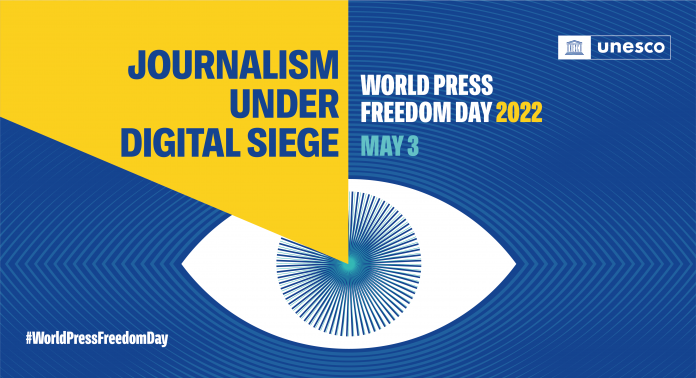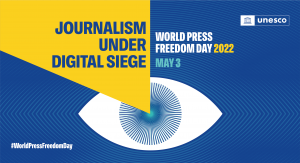-By Gbemiga Bamidele
Every year, since 1993, May 3 is a date that celebrates the fundamental principles of press freedom, to evaluate press freedom around the world, to defend media from attacks on their independence and to pay tribute to journalists who have lost their lives in the exercise of their profession.
World Press Freedom Day was proclaimed by the United Nations General Assembly in 1993 following a recommendation adopted at the twenty-sixth session of UNESCO’s General Conference in 1991.
At the core of UNESCO’s mandate is freedom of the press and freedom of expression. UNESCO believes that these freedoms allow for mutual understanding to build a sustainable peace.
It serves as an occasion to inform citizens of violations of Press Freedom; a reminder that in dozens of countries around the world, publications are censored, fined, suspended and closed down, while journalists, editors and publishers are harassed, attacked, detained and even murdered! May 3 is a date to encourage and develop initiatives in favour of press freedom, and to assess the state of press freedom worldwide.
This year’s World Press Freedom Day’s theme “Journalism Under Digital Siege”, spotlights the multiple ways in which journalism is endangered by surveillance and digitally mediated attacks on journalists, and the consequences of these on public trust in digital communication.
Privacy used to be considered a concept generally respected in many countries with a few changes to rules and regulations here and there often made in the name of common good. Things have changed and not for the better.
As surveillance becomes a common factor of our daily lives, privacy is in danger of no longer being considered an intrinsic right.
Surveillance can exposé information gathered by journalists including from whistle-blowers and violates the principle of source protection, which is universally considered a prerequisite for freedom of the media and enshrined in UN resolutions. Surveillance may also harm the safety of journalists by disclosing sensitive private information, which could be used for arbitrary judicial attack.
Between 2011 and 2021, the Committee to Protect Journalists (CPJ) recorded dozens of incidents of journalists being targeted by spyware. The committee also found that these attacked often go hand in hand with other press freedom violations and hinders journalists’ ability to cover stories on issues like politics and corruption. These findings were supported by investigative journalism and fact-checking organizations uncovering the fact that hundreds of journalists have been selected as targets.
Privacy is a pre-requisite for journalists to do their work and ensuring our access to fact-based and reliable information. It is a necessity if journalists are to communicate freely with sources, receive confidential information, investigate corruption, and guarantee the safety of themselves and their sources.
In a brief titled “Letting the Sun Shine in”: Transparency and Accountability in Digital Age, UNESCO present enhancing transparency as a third way between state overregulation of content, which has led to disproportionate restrictions on human rights, and an approach that has failed to effectively address problematic content such as hate speech and disinformation. The brief comes at a moment of heated debate on the power of internet companies in economic, social and political life, and their role in shaping the communication landscape.
The 26 high-level principles included in the brief span across issues related to content and process, due diligence and redress, empowerment, commercial dimensions, personal data gathering and use, and data access. It discusses how greater transparency in the operations of internet companies could strengthen freedom of expression and other issues central to UNESCO’s work, and it outlines mechanisms and initiatives. The brief sets out a preliminary selection of illustrative high-level principles, which could serve as a basis for future discussions towards a framework for transparency to guide companies, policy makers and regulators.
These developments complement other issues related to journalism under digital siege. More transparency by internet companies such as the use of “ad tech” could help news media with viability issues, as well as their negotiations for a share in the revenues that are generated through online news appearing on their platforms. Greater transparency, and better privacy protection, would also advance accountability of the internet companies, and enhance public understanding of the online ecosystem. In turn, this could lead to greater trust than digital communications do justice to availing reliable content such as free and professional journalism.
There is a growing awareness and mobilization of citizens, media workers and organizations, pushing to reclaim data privacy and ownership, and to ensure transparency as part of the solution to arbitrary surveillance, weakened news media viability, and a decline in public trust.
May 3 acts as a reminder to government of the need to respect their commitment to press freedom. It is also a day of reflection among media professional about issues of press freedom and professional ethics.
Gbemiga Bamidele is the Convener & Chairman, Society for Journalism Enhancement Initiatives.


